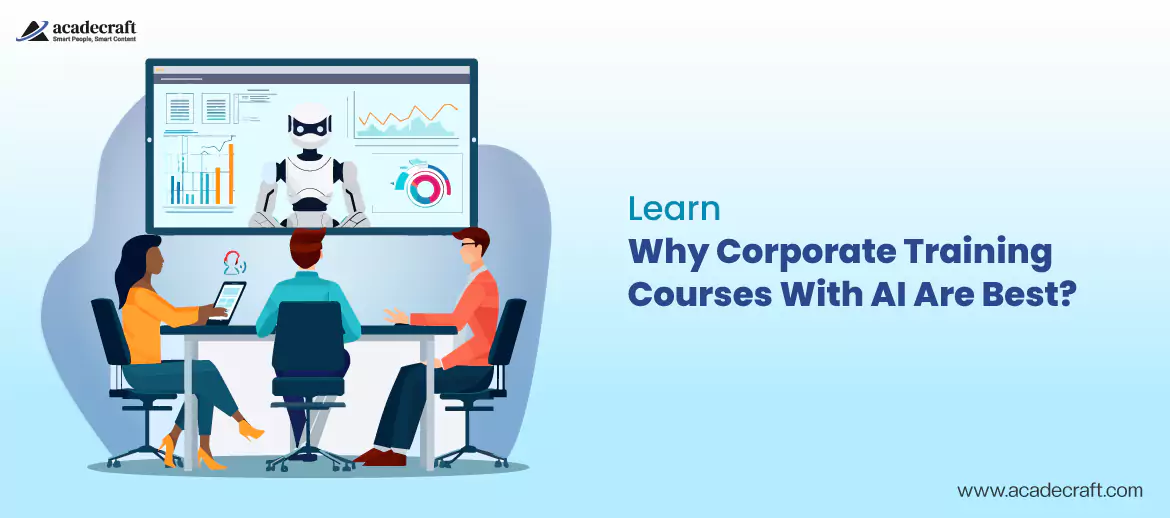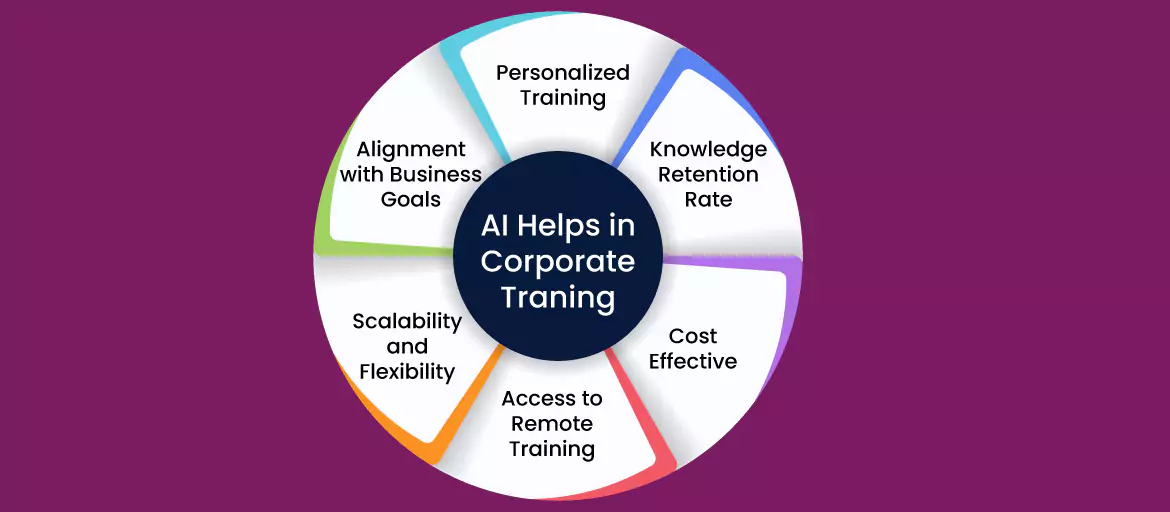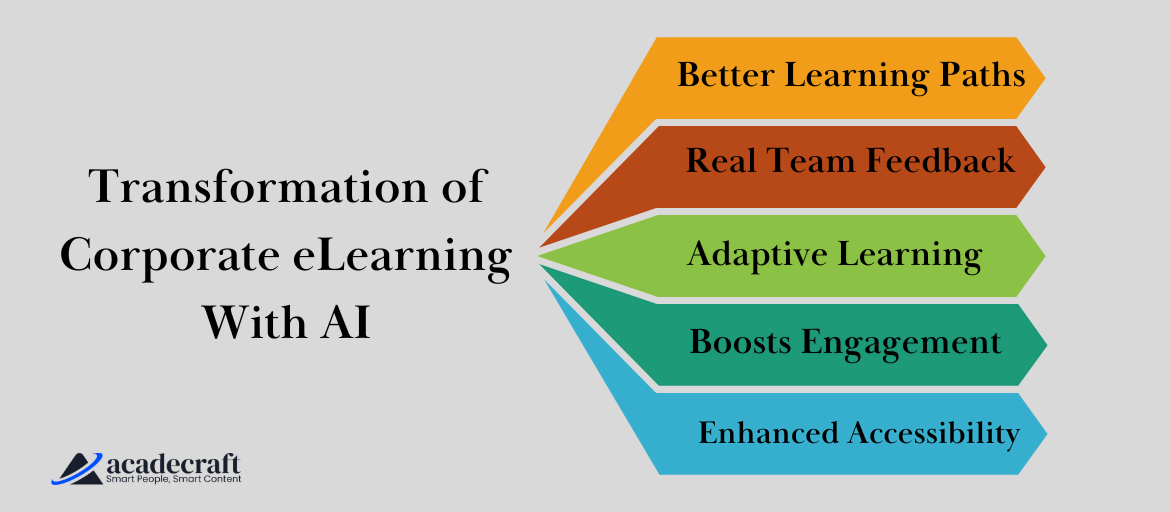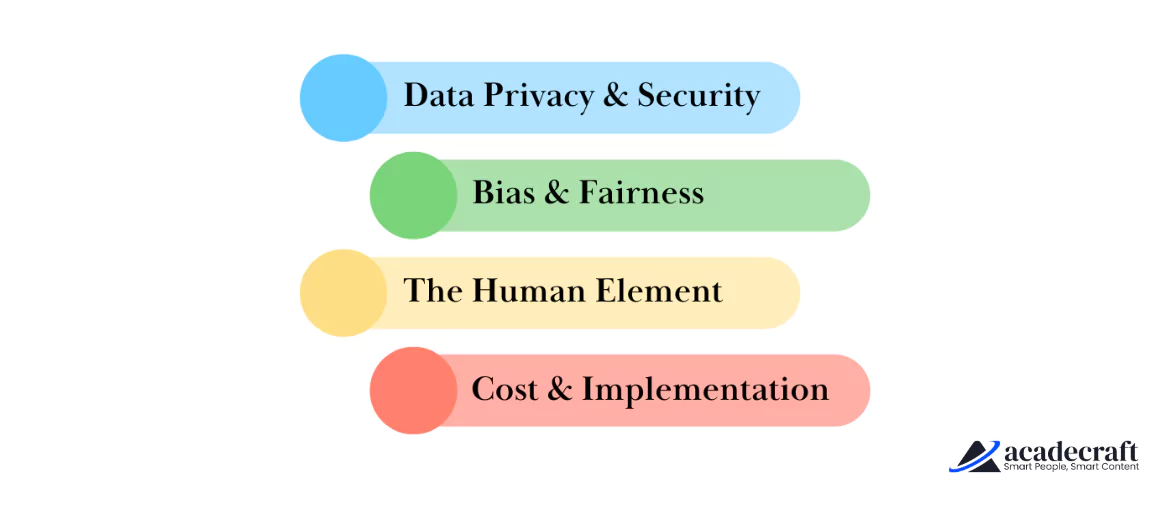
AI is really on the run to change the way of learning and completing a task. It has taken the workload off of our shoulders and provided us with a feature of smart working. According to the study of PwC, companies that are using AI in their corporate training are likely to see 10% growth in employee productivity. They will also see a 5% decrease in the training cost. Using AI-integrated corporate eLearning solutions will be the ultimate win for a corporate.
Let’s understand this with an example:
Walmart, one of the leading companies in America, was facing trouble in training their employees. Training a huge workforce without proper methods is an actual tough task. They were not getting the expected results from their training programs until they used AI-powered corporate training courses. With the help of AI-integrated corporate training courses, Walmart successfully trained its workforce in a personalized learning environment. It results in improved productivity and quality of work.
Just like Walmart, any corporate can use corporate training courses to give their employees a chance to develop new skills and improve their performance. Now, let’s discuss more about AI integrated corporate training courses in 2024.
Over time, there have been notable transformations in corporate training. In the past, training took place in classrooms or via seminars that were characterized by long PowerPoint presentations, lectures, and group activities. Though they were somewhat productive, such approaches had shortcomings, including no personalization to them; hence outcomes remained unmeasured, and keeping workers engaged was difficult.
With the rise of e-learning platforms, corporate training has become more accessible and flexible. Employees could now access training materials online, allowing them to learn at their own pace. However, e-learning still lacked the personalization and real-time feedback that could enhance the learning experience. This is where AI comes into play.
AI has brought a lot to the table. Corporations are getting so much help in training their employees. The benefits of using AI-integrated corporate training courses are as follows:
1. Personalized Training: Getting trained on things that benefit you the most would be great, no? It is now possible with the help of AI. Corporate eLearning solutions with AI integration provide personalized training options. Employees only learn those things that are beneficial to them. They won’t have to waste their time on training modules that are not relevant to their job. It saves their time and effort on the training and makes them more interested in eLearning corporate training.
2. Cost-effective: After the integration of AI in corporate eLearning solutions, training has become very budget-friendly. Because of the budget-friendly feature of corporate training, many corporations have started investing in training. The cost of training depends on the price of your course. AI-integrated corporate training courses are cheaper as compared to other training courses.
3. Better Knowledge Retention Rate: Learning something is only beneficial if you are able to apply that knowledge to real-life scenarios. But if you are learning something in your training and you won’t be able to retain it then what’s the point? Online corporate training courses with AI guarantee better knowledge retention rates. eLearning industry has applied engaging techniques like gamification and scenario-based learning in training courses to improve the learning experience of users. If learners get knowledge in a fun way, they will remember it for a long time.

4. Remote Access to Training: If you have a remote workforce, training them would have different problems. Online training modules help organizations train their remote workers with the same enthusiasm and interaction. The AI conversational tools help the employees interact while learning. It keeps their focus intact and engages them in activities.
5. Scalability and Flexibility: AI-driven training platforms are very dynamic and can be scaled up to meet the needs of any organization, irrespective of its size or line of business. This means that whether it is a small teams training programme or one for the entire personnel working in different locations across the globe, AI can maintain uniformity while at the same time providing top-notch quality throughout. Furthermore, through this capability to match various types of learners and their respective requirements, AI keeps on ensuring that as it develops, training remains pertinent to those organizations.
6. Better Alignment with Business Goals: AI's data-driven insights enable organizations to align their training programs with their business goals more effectively. By analyzing employee performance and training outcomes, organizations can identify skill gaps, prioritize training initiatives, and ensure that their workforce is prepared to meet current and future challenges. This strategic alignment leads to better business performance and a stronger competitive edge.
AI's integration into corporate training is a game-changer. By leveraging machine learning, natural language processing, and data analytics, AI can create a more personalized, efficient, and engaging learning experience. Here are some ways AI is transforming corporate training:
One of the most significant advantages of AI in corporate training is its ability to create personalized learning paths. AI algorithms analyze data from employees' past performance, learning preferences, and even behavioral patterns to tailor training programs that suit their individual needs. This level of personalization ensures that employees receive training that is relevant to their roles and skill levels, making the learning process more efficient and effective.
For example, if an employee struggles with a particular concept, the AI system can identify this and recommend additional resources or practice exercises to help them improve. Conversely, if an employee is excelling, the system can suggest more advanced topics to challenge them further.
AI-powered corporate training platforms can provide real-time feedback and assessment, allowing employees to understand their strengths and areas for improvement immediately. Traditional training methods often involve waiting days or weeks for feedback, which can delay the learning process. With AI, employees can receive instant feedback on their performance, enabling them to make necessary adjustments and improve their skills more quickly.
Moreover, AI can assess employee performance more accurately than human instructors by analyzing vast amounts of data and identifying patterns that might not be apparent to humans. This leads to more objective and precise assessments, ensuring that employees are evaluated fairly and consistently.

Adaptive learning is a key feature of AI-integrated corporate training. This approach allows the training program to adjust in real time based on the learner's progress and needs. If an employee is struggling with a particular module, the system can adapt by providing additional resources or altering the content delivery to suit their learning style. This ensures that employees receive the support they need to succeed without feeling overwhelmed or frustrated.
Adaptive learning also allows for differentiated instruction, where employees with varying levels of expertise can learn at their own pace. This flexibility makes training more inclusive and effective, catering to the diverse needs of the workforce.
One of the challenges of corporate training is keeping employees engaged. Traditional training methods can often be monotonous, leading to disengagement and lower retention rates. AI-driven training platforms can incorporate gamification elements, such as quizzes, challenges, and leaderboards, to make learning more interactive and enjoyable.
Gamification not only increases engagement but also enhances motivation. Employees are more likely to participate actively in training when they see it as a fun and rewarding experience. Moreover, AI can track employee progress and provide personalized rewards or recognition, further boosting motivation and commitment to learning.
AI-powered corporate training platforms can make learning more accessible to employees with different abilities and learning preferences. For instance, AI can provide alternative content formats, such as audio, video, or text, to accommodate various learning styles. Additionally, AI can offer language translation and speech recognition features, making training materials accessible to employees who speak different languages or have hearing impairments.
Enhanced accessibility ensures that all employees have equal opportunities to learn and develop their skills, regardless of their circumstances. This inclusivity not only benefits employees but also contributes to a more diverse and capable workforce.
While the benefits of AI-integrated corporate training are clear, organizations must also consider potential challenges and ethical implications. These include:
1. Data Privacy and Security
AI relies on vast amounts of data to deliver personalized and adaptive learning experiences. However, this raises concerns about data privacy and security. Organizations must ensure that they comply with data protection regulations and implement robust security measures to safeguard employee data.
2. Bias and Fairness
AI algorithms can inadvertently perpetuate biases present in the data used to train them. This can lead to unfair assessments or recommendations that disadvantage certain groups of employees. Organizations must be vigilant in monitoring and addressing potential biases in their AI-driven training platforms to ensure fairness and inclusivity.

3. The Human Element
While AI can enhance corporate training in many ways, it cannot replace the human element entirely. Human instructors play a crucial role in providing mentorship, guidance, and emotional support, which are essential for a holistic learning experience. Organizations should aim to strike a balance between AI-driven automation and human interaction to maximize the benefits of their training programs.
4. Cost and Implementation
Implementing AI-integrated corporate training platforms can be costly and complex, especially for smaller organizations with limited resources. Organizations must carefully evaluate the costs and benefits of AI integration and consider whether they have the necessary infrastructure and expertise to implement and maintain such systems effectively.
AI-integrated corporate training courses offer a transformative approach to employee development, providing better results through personalized learning paths, real-time feedback, adaptive learning, gamification, enhanced accessibility, and data-driven insights. These benefits lead to increased efficiency, improved learning outcomes, enhanced employee satisfaction, better alignment with business goals, and scalability. However, organizations must also consider potential challenges, such as data privacy, bias, and the need for a balanced approach that combines AI with human interaction.
As AI continues to advance, its role in corporate training will only become more significant. Organizations that embrace AI-driven training platforms will be better positioned to develop a highly-skilled, engaged, and adaptable workforce, ensuring their long-term success in an increasingly competitive business environment.
Share